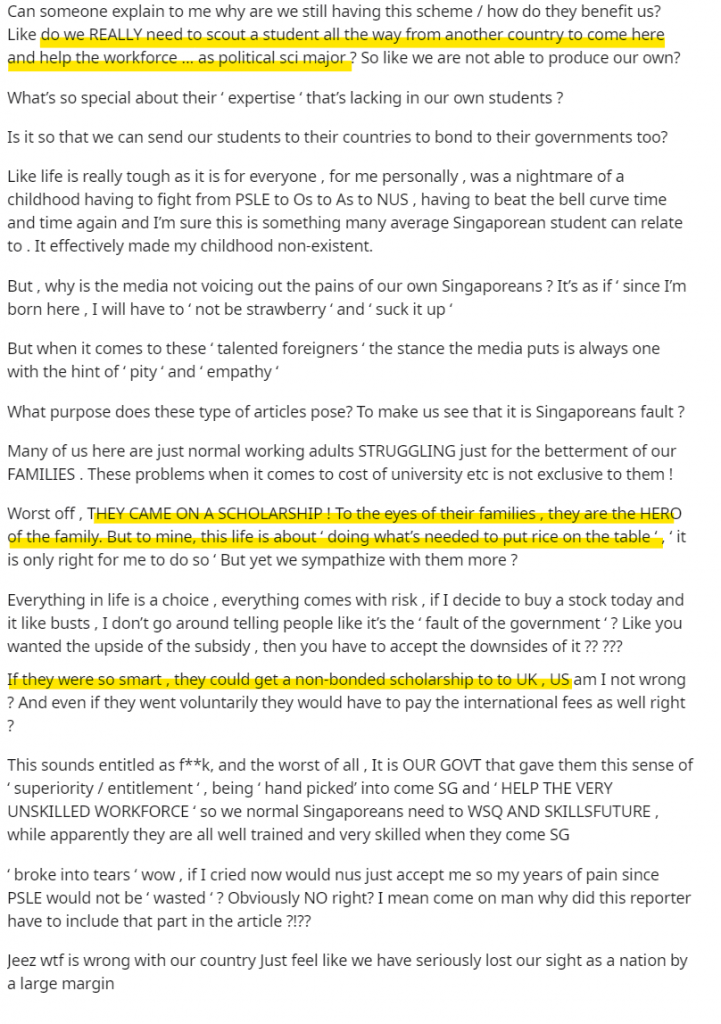Essentially, Permanent Residents (PR) and international students who undertake a Tuition Grant Scheme (TGS)—which subsidises their university fees by up to $20,000 a year—have to serve a three-year bond of employment in Singapore upon graduating.
In previous years, the scheme had worked as intended. International students attracted to local universities contribute to, and diversify, our economy as they enter the workforce. But with Singapore’s economy depressed by Covid-19, these students are finding it hard to fulfill their bond. Worse, some have secured a job, only to have their Employment Pass (EP) rejected by MOM—despite having to serve a three-year bond under MOE.
A Reddit thread on the article attracted over 300 comments, most of them from Singaporeans unfamiliar with the Tuition Grant Scheme. In response, RICE invited three international students, all of whom are TGS holders, to respond to selected comments from the Reddit thread in the hopes of clearing up misconceptions, finding out if these comments are justified.
The three students are:
1. Aaron, a 2019 Yale-NUS graduate from Oceania, who came to Singapore on a dependent pass when he was 15;
2. Ben, a 2020 NUS graduate from Vietnam, who came to Singapore on a student pass when he was 15;
3. Charles, a 2020 NUS graduate from Thailand, who came to Singapore on a student pass when he was 14 .
Note: As all three of them are in the process of applying for PR status, they have requested anonymity and are referred to by pseudonyms, lest their chances of getting PR are jeopardised.

Charles: I’ve been here for 10 years; I came here at the start of 2010 with my brother. We were 14. My mum made a decision that changed our whole lives in a whole month. In November 2009, we were told to come to Singapore, in January 2010, we were here.
It was decided for us that we were going through this path. The path is carved out for us. All we could do was try our best and go to university in Singapore. That’s what my brother and I did. We didn’t really have a choice at such a young age.
We have integrated well into the local social fabric, but still, in the end we are sort of blocked on both sides. This guy’s comment is pretty unfair, comparing us to people who come to Singapore just for the job.
Ben: After finishing secondary school in Singapore, I started to think about whether I want to go overseas for university, or if I want to stay in Singapore.
I made the decision to stay here. For the past 6 years, at that point of time, Singapore was all I had. My friends, my social circle. A big part of my decision of why I chose to go to university in Singapore with the tuition grant is because this is the country where I live.
A lot of people will ask, ‘Why have you not applied for PR or citizenship then?’ Applying for PR is not as easy as some may think. It’s very hard … the employment policy lumps all of us together, whether we’ve been in Singapore since a young age or are here just to look for a job. But as I’m saying this I also appreciate that the foreigners who are only here to work, sometimes it’s not their choice also.
The point about depressed wages: it’s not because of us that you have depressed wages. It’s because of the company and policies that allow them to depress the wage.
Companies are able to pay us a bit higher because they don’t have to pay us CPF, that’s the idea. But the discrepancy between foreign and local PMETs is not that big.
The depression of wages is because businesses want to cut costs. It’s not because we are here.

And I also know people who graduated and got high-paying jobs overseas. But they bought out the bond. So I don’t know anyone who upped and ran without paying the money back.
About the second comment: people think you can get released. No one can be released. Even the person who got cancer, MOE said, ‘You come back after you’ve beaten cancer.’ No one I know has been released from their bond.
Ben: Yes, speaking as someone on the tuition grant, it’s unclear if they’ll take away our bond if we can’t find a job for 12 months.
Charles: Even if we give them evidence that we have been looking for a job for a year, and are unable to find one, MOE will probably extend the bond. I don’t remember anyone who got released from the bond, ever.
Aaron: Ever. Ever. I know people who have been searching for 11 to 12 months. And they are still searching.
Charles: Similar to Aaron, I only know people who got really good job offers overseas, and are able to pay back the bond at one shot. Or the company wants the talent and pays off the bond for the candidate. Personally, I do not know anyone who just ran away.

Aaron: I will happily work on an S Pass but I couldn’t get it because most companies reserve it for certain people.
Ben: Each company has a quota of 13% for S Pass. They save this quota for so-called less-skilled positions. If the company is small, this means only one or two S Pass positions are available.
So that leaves us with EPs. In March, when I saw that they raised the minimum from 3.6k to 3.9k, I panicked so much I emailed the school and MOE. I wrote, ‘We’re in a pandemic, how are you expecting us to find a job that pays 3.9k right away after graduating?’ The school said that they will provide career guidance and resources. But most of the time, we cannot count on the universities to help us.

Aaron: I’m willing to serve NS at any moment’s notice. I actually tried to serve NS 3 times. I tried once at 18, but MINDEF told me ‘no’ because my parents just had their PR application denied. Half-way through university, I wrote in to ask again, but they said no. At the end of university, there was a foreign student PR scheme that came up, so I applied, fully knowing that I would have NS obligations. But I got denied again.
I really wish I had done NS.
I would have happily become some sort of OCS dude if I could. I know I differ from a lot of other kids here … perhaps it would even have been better for me if I had done NS so I could integrate better to Singapore.
Ben: I didn’t know the government rejects people from wanting to do NS. That’s very surprising to me.

Charles: Personally, I don’t know that many people to know the trend. But it’s the same for me, if I get PR I’ll stay. I’m actively trying to get PR.
Ben: I am planning to apply for PR at the end of next year. In any case, most of the international students I know want to get PR.
Aaron: I don’t know anyone who’s returned home. I know people 3 years above me, who finished their TGS bond, but decided to stay here.
And no one in the TGS sticks only to their own circle. That’s the dumbest thing I’ve ever heard. All of us live and work with Singaporeans. I’m talking about 40 to 50 people who have taken the TGS. None of them have exhibited these qualities. The percentage marrying or dating a Singaporean is super high. (laughing) They’re even helping to bump Singapore’s birth rate.
I don’t buy it for a second. Unless they’re getting recruited in some India- or China-based company, but that’s just Shopee.
Laughter.
Charles: I think it’s a stereotype.
Ben: There is one big reason why we don’t stay with Singaporeans. Why? All Singaporeans have their own housing. They live in HDBs with their parents. So how do they expect us to stay with them and their parents? So I do agree to an extent. Some social circle bubbles exist because of housing.

Ben: Most of the people I know are unable to find a job because no one offered. Like my friend—he sent to every single job he could but none offered.
And I don’t see why a person who is a foreigner and has received tuition grant should be any less selective about their own career, just because their education was partly funded by taxpayers.
Charles: I have to agree with Ben on this one. All of us know we’re strong in certain aspects, weak in others. It’s not that we’re only aiming for the top, the best paying jobs. That’s unrealistic.
But after working so hard during university to build your resume, it’s absolutely reasonable to have some level of preference in applying for jobs, because we know we are more suitable for certain jobs.
Still, all of us practise some common sense to make sure we are not too selective because we do want a job. The pressure is there.
Ben: In fact, there’s a practical reason for anyone to choose a preferred job. Because it’s a job where we can contribute the most, regardless of wage. Everyone is going to be exploited in a job anyway, whether it’s low wage or high wage, EP or S Pass.
Laughter.
Ben: In that sense, a preferred job is actually better because in that way we might have a chance to enjoy what we do, put our effort into it, contribute more, to GDP, or any other metric. So I don’t see why, from Singaporeans’ point of view, it’s bad that we are choosing our preferred job. Especially when they have been using taxpayers’ money to subsidise our tuition. Might as well let us do something we’re good at.

Laughter.
Aaron: A common misconception is that we came on scholarship but I’m not.
Ben: Same.
Charles: I have a huge student loan.
Aaron: Me too. If they were so smart they could get a non-bonded scholarship to UK. I couldn’t. That’s why I’m here.
But the people who are making these comments don’t understand what is needed in Singapore’s PMET scene. It needs a variety of cultures, languages, geographical scenes. MOE carefully calculates who they are bringing in. They know what they are doing. Why did they want Ben and Charles here? Because they speak Thai and Vietnamese. It’s great for businesses. I have a shitty grade, but why did they want me? I bring in all this money to my company through my connection with my home country. MOM needs to recognise this.
At the student level, the people MOE brings in are purposefully diverse to bring in business, social, and political links. How many Indonesian kids you know—their father is some rich Indonesian tycoon? That’s why you see so many rich Indonesian kids in public universities.
Singaporeans do not have the same sort of connections. MOE specifically recognises the value of bringing in people from these backgrounds.
By virtue of being different I have more value than a Singaporean. That’s the uncomfortable truth.
For Singapore to succeed, some locals have to lose out. Some foreigners have to succeed. But when one foreigner succeeds, it can also mean more locals succeed overall.
Ben: I understand their concerns and predicaments and stand by them. They are struggling: not being able to find jobs, having to cope with their expenses at this time … What they are saying is correct. The government should be looking after its citizens.
Where I don’t stand with them is that, the same problems they have, we have too. To the eyes of their families, they are the HERO of the family. But to mine, this life is about ‘doing what’s needed to put rice on the table’. For us, we also need to put rice on the table! We are not on scholarship. A lot of us have debt. And we are the same as them. We have to pay tuition fees—we have to pay higher tuition fees, compared to local students, even with the tuition grant.
It’s not entitlement. We read the contract. We sign the contract. The contract obliges us to find employment to pay off our bond. It’s not like we say that we deserve a job. We have to look for opportunities ourselves to pay off the debt.
They’re going after the wrong people. We don’t fault Singaporeans for our current circumstances. The reality is that there is a lot of confusion from both the authorities and employers that makes it difficult for us to fulfill our bond.
We simply ask Singaporeans to consider that we also share the same pain as you.
We know Singaporeans are struggling. But we are struggling too.






